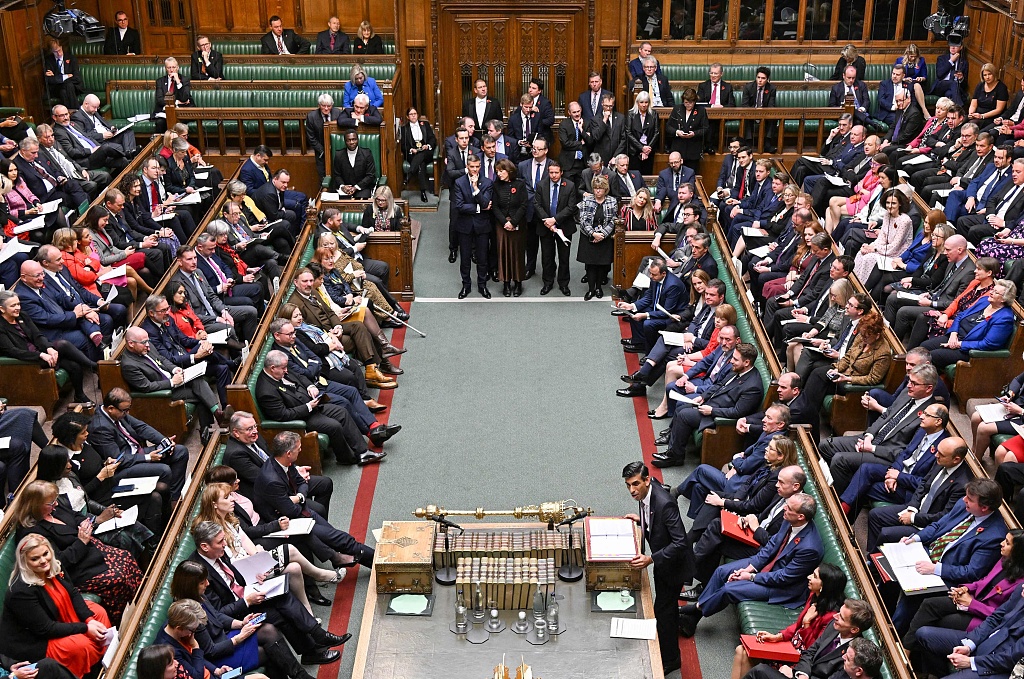
Britain's Prime Minister Rishi Sunak listens to a speaker during the Lord Mayor's Banquet at Guildhall in central London on November 28, 2022. /CFP
Britain's Prime Minister Rishi Sunak listens to a speaker during the Lord Mayor's Banquet at Guildhall in central London on November 28, 2022. /CFP
Editor's note: Abhishek G Bhaya is a senior journalist and international affairs commentator. The article reflects the author's opinions and not necessarily the views of CGTN.
British Prime Minister Rishi Sunak appears confused on China. Delivering his first major foreign policy speech on Monday, the new incumbent of 10 Downing Street gave out mixed signals on how his government intends to deal with Beijing.
On the one hand, Sunak declared the end of the "golden era" of China-UK ties, asserting that China posed a "systemic challenge" to British "values and interests," but on the other, he also effectively called for constructive "engagement" with Beijing.
"Of course, we cannot simply ignore China's significance in world affairs, to global economic stability or issues like climate change," Sunak, who completed a month in office on November 25, said while addressing the Lord Mayor's Banquet at Guildhall in London.
"The U.S., Canada, Australia, Japan and many others understand this too. So together we'll manage this sharpening competition, including with diplomacy and engagement," Sunak remarked as he warned against "simplistic Cold War rhetoric."
While the bellicose tone and tenor of the speech were likely intended to appease the anti-China hawks in the country, it seems Sunak failed on that front too. Hardliners, even from Sunak's own Conservative Party, were not impressed and snubbed the prime minister for not formally classifying China as a "threat" and accused him of being "soft" on Beijing.
There's a background to this backlash.
In a political career spanning over 12 years, Sunak hasn't always been an anti-China hawk. Prior to the Tory leadership campaign, Sunak was seen as a politician and lawmaker with a pragmatic view on China, a perception that was exploited by his opponents within the party, including his predecessor Liz Truss, to accuse him of being soft on Beijing.
Even in his policy speech on Monday, the prime minister proposed "robust pragmatism" in dealing with "our competitors" (read China). Critics, including those within the Conservative Party who regard Sunak as less hawkish on China than his predecessor Truss, saw this as a gesture of "appeasement" to China and tore the innocuous phrase to bits.
Former Conservative leader and a known Beijing critic, lawmaker Iain Duncan Smith, who co-chairs the Inter-Parliamentary Alliance on China, ridiculed the phrase as a "contradiction in terms." He argued that Sunak's "robust pragmatism" could mean "anything you want it to mean" and amounted to "appeasement."
Opposition Labour Party's foreign affairs spokesman David Lammy described Sunak's speech as "as thin as gruel," noting that "all it shows is that once again the Conservative government is flip-flopping its rhetoric on China."
Due to this dominant and bipartisan anti-China narrative in the UK's domestic politics, Sunak had to take the bait and harden his position on China during the Tory leadership campaign that ended in his successful political elevation. Now, as prime minister, he feels compelled to be "tough" on Beijing to retain support from right-wing Conservative lawmakers.
Domestic politics driving UK's China agenda

A handout photograph released by the UK Parliament shows Britain's Prime Minister Rishi Sunak standing and speaking at the Despatch box during Prime Minister's Questions (PMQs) in the House of Commons in London, November 9, 2022. /CFP
A handout photograph released by the UK Parliament shows Britain's Prime Minister Rishi Sunak standing and speaking at the Despatch box during Prime Minister's Questions (PMQs) in the House of Commons in London, November 9, 2022. /CFP
Related story: British PM is ill-advised to disband Confucius institutes
This political compulsion stands at the core of the dilemma that the British prime minister is facing today while steering the UK's policy on China. His recent decisions and rhetoric on China – from branding Beijing as a "systemic challenge," to the ill-advised ban on Confucius Institutes, and vetoing the takeover of the Newport Water Fab by a Chinese-owned firm – are all hostile and destructive.
The British prime minister's China agenda is driven by domestic politics and not by objective considerations for long-term national interests. His China policy is full of contradictions, lacking any "robust pragmatism" and "constructive engagement" with Beijing that Sunak professes in his policy speech.
Sunak faces numerous challenges that could imperil his political survival, as well as set the course for Britain's position in the emerging world order. Ever since Brexit, Britain's foreign policy has dropped the semblance of reason, restraint and balance in favor of imperial nostalgia and ultranationalism – a path that has severely impacted that national economy, which is technically in a state of recession.
Meanwhile, the UK has pursued a policy of cutting its ties with Europe, decoupling itself from China as a key trading partner, and a full-throttle confrontation with Russia over the Ukraine conflict. Analysts say most of these decisions have been taken under the influence of Britain's former colony and now strongest ally, the United States.
Urgent course correction needed
These events are taking a significant political and economic toll on the UK. Sunak's government could be aware that an urgent course correction is imperative and in the national interest. It will need a colossal political will and effort on the government's part to create the required political space – which has increasingly been curtailed by the Conservative Party's ideology-driven foreign policy – to chart out such a course, which in Sunak's own words, is "pragmatic."
As such, describing China as a geopolitical adversary while calling for constructive engagement with Beijing seems meaningless and in bad faith. Sunak must take a long-term view beyond the immediate domestic politics and overcome his confusion on China in national interest.
Abandoning the policy of hyper-Sinoscepticism and reverting to a more pragmatic and realistic position on China, which Sunak displayed in his previous role as Britain's chancellor of the exchequer, could be the first positive and crucial step in the right direction.
(If you want to contribute and have specific expertise, please contact us at opinions@cgtn.com. Follow @thouse_opinionson Twitter to discover the latest commentaries on CGTN Opinion section.)